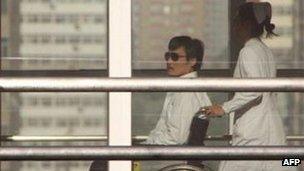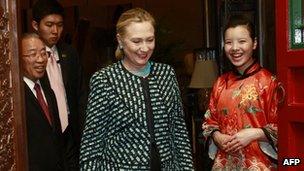Not the end but the beginning for Chinese dissident
- Published

Mr Chen was taken to a Beijing hospital after leaving the US embassy
A potentially damaging diplomatic crisis involving the Chinese activist Chen Guangcheng appears to have been averted - for now.
Mr Chen emerged from the US embassy in Beijing, where he spent six days, after receiving "understandings" about his future.
Friends said the 40-year-old believes he will now be free to go to university in China in a "safe environment" for him and his family.
This resolution came before China and the United States sat down for high-level talks in the Chinese capital. Officials on both sides will be hoping they can now discuss other issues free from what would have been a major distraction.
But this affair might not be over.
It is difficult to see how Mr Chen has been given guarantees that will allow him to carry on his activism, inside China, if that is the life he chooses to pursue.
And the US will have limited scope to ensure China abides by any promises it has made.
Hours after Mr Chen came out of the US embassy, another issue emerged: one friend suggested the activist had been forced into making this deal against his wishes.
<bold>Bad timing</bold>
This incident still has the potential to turn into a crisis and the timing could not have been worse.
China and the US are about to start the fourth round of the Strategic and Economic Dialogue on Thursday.
These are annual, wide-ranging discussions involving the US Secretary of State Hillary Clinton and Treasury Secretary Timothy Geithner.
Chinese Vice-Premier Wang Qishan and State Councillor Dai Bingguo will lead Beijing's delegation.
The reluctance to publicly discuss Chen Guangcheng's flight to the US embassy while he was there suggests both sides wanted to find a resolution before the talks began, so they would not be overshadowed.
Behind the scenes there was "intense diplomacy", according to US officials who briefed reporters on Wednesday.
When Mr Chen came out of the embassy, China immediately issued a statement expressing its anger with the US and demanding an apology from the Americans.
"What the US side has done has interfered in the domestic affairs of China," said foreign ministry spokesman Liu Weimin.
But that was the public face of the government, to show its citizens it was standing up to the US.
<bold>'Waiting thugs'</bold>
What China did not say, as the Americans contend, is that they had given both Washington and Chen Guangcheng assurances that he would be safe if he left the embassy.

Hillary Clinton is in China this week for key talks with Chinese authorities
"Mr Chen has a number of understandings with the Chinese government about his future," Hillary Clinton said in a statement released a few hours after the activist came out.
The Chinese authorities also allowed Mr Chen's wife and two children to travel to Beijing so the family could be reunited, another indication they were being more flexible on this issue than their public comments suggested.
As far as the Americans were concerned, they seem convinced they have negotiated a deal that is good for them and Mr Chen.
"I am pleased that we were able to facilitate Chen Guangcheng's stay and departure from the US embassy in a way that reflected his choices and our values," said Ms Clinton in her statement.
US officials have maintained that it was Mr Chen's choice to leave the embassy and stay in China so he would have "an opportunity to make a difference, to continue to make a difference".
But the ruling communist party tolerates little dissent. Activists are harassed, kept quiet and occasionally sent to prison.
So it is hard to see how China can offer any meaningful guarantees to Mr Chen if he continues to speak out.
"He has the admiration of the world right now and that will perhaps help keep him safe in the short-term, but I am fearful what could happen if the world loses interest," said Bob Fu, president of China Aid Association.
Mr Fu, whose organisation is a Christian human rights group based in the US, has been close to those involved in the negotiations over Mr Chen.
Another issue could also emerge over the coming days - Mr Chen might not be as happy about the outcome to this affair as the Americans maintain.
Zeng Jingyan, a Chinese activist, spoke to Mr Chen after he came out of the embassy.
She said he told her that he had to accept the deal because otherwise "his wife and daughter and son will [be] sent back to Shandong" where "thugs with sticks are staying in their home, waiting for them".
The Chen Guangcheng affair might not yet be over.